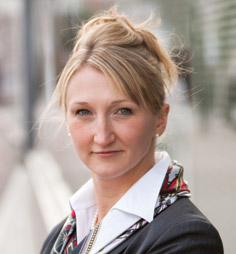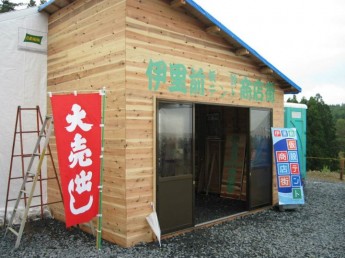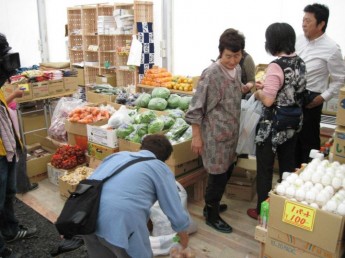
For the past five months, the BCCJ’s work in Tohoku has been driven by a simple mantra: we are supporting a recovery, not a disaster area. The time for donations—food, clothing, water, blankets—has long passed. Since June, all BCCJ cash donations have been spent on the provision of enabling resources to support local, stakeholder-led projects that have the potential for development, growth and sustainability.
Community confidence
In our Weekly Round Up on 2 September, we highlighted a request from residents of Utatsu, in Minami Sanriku, to fund the establishment of a tented market. With 14 temporary housing sites in the area accommodating 2,000 people, and the nearest shops a ¥6,000 round-trip taxi ride away, the local community was keen to provide a solution.
On 15 October, supported by generous BCCJ members and former British Business Awards winners Refugees International Japan (RIJ) and Whisk-e Limited, the Isatomae market—six shops and a children’s play area—opened for business. RIJ pledged ¥2mn for water, electricity, security and start-up funds for traders, while the Royal Bank of Scotland Japan recently promised additional funds for infrastructure. Jane Best, CEO of RIJ, said: “This is a community project— conceived by the community, set up by the community, and run by the community for the community. We hope it will give confidence to other traders and help bring the fractured community back together”.
Fresh is best
 In early October, we received a request for an industrial freezer from the Hodade Cooperative Industry Assembly, 20 fishermen working to revive their businesses in Funakoshi. The freezer would store seaweed, salmon and sea urchin—all special products of the area. About 90% of the houses and facilities in the town were washed away in the March tsunami and, because Funakoshi is isolated from the fish market in central Ishinomaki, the fishermen can’t sell their catches on the day they are caught.
In early October, we received a request for an industrial freezer from the Hodade Cooperative Industry Assembly, 20 fishermen working to revive their businesses in Funakoshi. The freezer would store seaweed, salmon and sea urchin—all special products of the area. About 90% of the houses and facilities in the town were washed away in the March tsunami and, because Funakoshi is isolated from the fish market in central Ishinomaki, the fishermen can’t sell their catches on the day they are caught.
A freezer, bought from a local supplier and installed in mid-October using BCCJ funds, is being shared by the Hodade group for making large amounts of ice to support their daily activities. Ishinomaki resident Masae Ishikawa writes: “I cannot thank [the BCCJ] too much. The village to which you donated the freezer is my mother’s hometown, so it means so much to me to help people there, and I am grateful to you”. The Hodade fishermen now have the hope that they can rejuvenate the local economy and encourage other locals to join an expanding industry.

Harvesting productivity
Further to the successful delivery of a tractor, plants and seeds to Minami Sanriku—a request that reached us via the BCCJ’s www.wecarejapan.org aid portal—and to the subsequent harvesting and sale of vegetables from two fields, I am pleased to report that local residents are making great strides. The Green Farmers Association (GFA), supported by a volunteer group, OGA for Aid, is planning to establish small farming cooperatives of five or six local families across 20 fields. The GFA’s key aims are to create jobs for residents of the area and, thereby, to help rebuild the area’s agricultural industry by reviving the land’s commercial productivity. Firms in the region, including hotels, are interested in buying GFA fruit and vegetables and the BCCJ is now talking with the GFA about start-up costs. We look forward to visiting the area in late November and relaying a positive update in the December edition of BCCJ ACUMEN.





